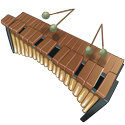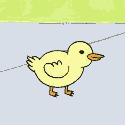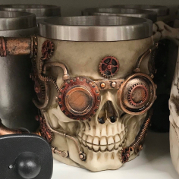|
Why are you using your onboard sound if you have the Scarlett?
|
|
|
|

|
| # ? May 12, 2024 12:15 |
|
What do you mean? The Scarlett is my input device, I still need playback. Unless I use ASIO4All as my output interface I get terrible latency. But then I can't use any other audio programs.
|
|
|
|
Magnitogorsk. posted:I want to be able to play guitar pro mainly. Install the drivers for the Focusrite box you bought. Use it as your sound card. You can hook up monitors to it via the 1/4" jacks on the back or use the headphone jack. Any music or whatever that you play on your computer should route through it.
|
|
|
|
Ahhhh thank you it all makes sense now.
|
|
|
|
Been working on the western number in B minor, and the guitarist really wanted someone to play keys, almost specifically for that song, and that song alone, although it would never hurt having one. Its his opinion that the song is too thin with just the guitar, bass and drums. So, in an effort to help soothe the mutterings while trying to find someone to fit the job, I got the idea to try supplant the keys with the harmonica. Of course, playing chords on a diatonic harmonica is incredibly limited; and I'm not sure if there's anything that can cover a pattern in Bm. I've seen Lee Oskar has harmonic/natural minor harps in Bb, but would it be able to get Bb, F# and E, or even possibly G and D chords? EDIT:I also have a spare key of B harp that I can modify, if there's something I can do with that. Jeff Goldblum fucked around with this message at 03:06 on Feb 19, 2013 |
|
|
|
There are diatonic harps in all twelve major keys, so get one in D (=Bm). My question: I'm currently translating into English several course syllabi for a conservatory of music, and I cannot figure out what the accepted term is for what my language calls "musical imagination", i.e. one's ability to invent new melodic, harmonic or rhythmic ideas (or adapt old ones to new contexts) as well as create a mental representation of what one is hearing so as to study it. Googling "musical imagination" does give me some results but it's not very convincing. Anyone who can put me out of my misery? EDIT: I just realised, in English it's often described as "hearing" notes, changes, rhythms, whatever. But that's the colloquial description, I'm looking for a well-defined, more or less official one. cactuscarpet fucked around with this message at 20:56 on Feb 19, 2013 |
|
|
|
edit: I realized you're probably talking about "hearing" in your "mind's ear", not identifying what you actually hear. Aural skills isn't right. Oops.
Soup in a Bag fucked around with this message at 00:29 on Feb 20, 2013 |
|
|
|
So I don't think this warrants its own thread. But how do you guys get over your writers block? I've been in a rut for the past month where I can barely even get one song going, and even then I usually ditch it in the end... I've been thinking about pulling a Justin Vernon and heading down to my Grandparents cabin that is unoccupied right now and spending the week there trying to record ANYTHING.
|
|
|
|
Soup in a Bag posted:edit: I realized you're probably talking about "hearing" in your "mind's ear", not identifying what you actually hear. Aural skills isn't right. Oops. Exactly. It's a strangely elusive term. "Hearing" is a perfect intuitive definition, because that's exactly what it feels like, but it's way too confusing when used alongside "hearing" in its original meaning. I've begun to work around it by using "cultivating a mental representation of X" and such, but I'm still hoping for a better equivalent.
|
|
|
|
Fluency, maybe? I don't think it's an official name, but it captures it better than literacy or affinity. Still not perfect since it technically means the ability to keep going even if you don't have a full mastery, so I guess the musical equivalent would be to keep playing something so you don't have any moments where you can't think of anything to play. It might be generic enough to work though
|
|
|
|
What I'm looking for specifically though refers to a (possibly learned) familiarity with musical sounds/shapes that's strong enough for you to visualise and conceptualise them at will. Possibly, but not necessarily sumperimposing them over something you're hearing. Possibly, but not necessarily being able to execute them technically on an instrument. A common example is listening to a bare chord progression and then "hearing" a melody over it. It's essentially creative recall; drawing from an internal repertoire of sounds that's partly innate and partly learned (depending on the person). There must be a proper term for it. I'm hoping to keep the syllabus language as discrete as possible.
|
|
|
|
Just out of curiosity, what language are you translating from, and what's the native phrase?
|
|
|
|
The language is Dutch, the phrase is "muzikaal voorstellingsvermogen".
|
|
|
|
Musical imagination would probably be okay, although I kind of like Mind's Ear.
|
|
|
|
Musical imagination is perfect, it's not like it's some untranslatable thing like wabi-sabi. If there's no word for what you want, make it yourself! 
|
|
|
|
The thing is, because this is official documentation, I'm trying to make the terminology consistent with other conservatories and music schools in English speaking countries around the world. Making stuff up is thus my least desirable option. I mean, with translation in general you try to avoid that kind of thing unless there is absolutely no existing equivalent. In this case you'd really expect there to be one, with the amount of existing English texts on music education. edit: Actually mind's ear offers some promising results on google, so I'll look into it. Thanks, snorch! edit 2: Well I'll be damned: http://en.wikipedia.org/wiki/Audiation Unfortunately it's not used that commonly, so I hope I can get away with using it. cactuscarpet fucked around with this message at 11:29 on Feb 22, 2013 |
|
|
|
I want to buy a rack case that is only 12" deep. There's a 20" version available for $80 more. Would I be fine with the 12" version? The longest thing that I plan on buying is 9.2" deep. A quick glance at every rack device that has ever interested me shows the longest one of them by far is the Eleven Rack at 13.5" but I don't plan on buying that ever. Alternatively, the two racks I've mentioned so far are shockmount racks. Are they necessary, or is it perfectly okay to, say, gig locally with a regular old rack?
|
|
|
|
Gorilla Salsa posted:is it perfectly okay to, say, gig locally with a regular old rack?
|
|
|
|
I thought I would ask this here since a thread about it would probably annoy people. I was wondering what people's thoughts and experiences were as to having or acquiring AP (Absolute Pitch). I've read multiple conflicting things online about whether it is possible to learn AP as an adult, and finally settled on a USC Study which states that no adult has been documented learning it. But is it really impossible? At the risk of sounding like the pedantic jerk-off disappointed that he failed the test, there are some questions left open with how they've constructed their definition and test. The key question for me is whether AP vs RP or pitch deprivation is a difference in degree or kind. Despite looking at the USC study (http://perfectpitch.ucsf.edu/index.php) and numerous other sources, I am still not really convinced the difference is in kind. For those unfamiliar with the research and hooplah around this wonderful talent of beautiful Asian pianists, here's the rundown: 1) Absolute Pitch is the ability to identify a note without any reference. You hear a note, a sine wave at that frequency, whatever, and you know what note it is. 2) Relative Pitch is the ability to identify a note after being 'given' a reference. You can then use various skills that are common in ear training to establish further notes from this 'tonic center'. 3) Perfect Pitch is a nebulous term that has multiple meanings and lacks the scientific clarity if the above two terms. 4) Supposedly, only a handful of people in the population can do this, and everyone else can't. It's a difference in kind, not degree - you either can or you can't. Therefore, a genetic or otherwise natural/innate cause is suspected and is the motivation for research. Research has shown that people who speak tone languages (many Asian cultures) have an overwhelming disposition to AP. One Chinese pianist said all 25 of her classmates had this ability and didn't even realize it was an issue until she came to the west and ran into different tuning systems (as well as mostly non-AP individuals). The introduction to the study states that if you can sing A off of the top of your head, then you 'have it'. Supposedly, only 1 in 10,000 people possess this ability and they belong to an elite club of walking talking pitch pipes. The problem is that this introduction plays right into common perceptions and mis-perceptions about this phenomenon. Later in the survey, you can say if you think you have it or not and then one category says "How fast can you recognize a pitch?" to fill out if you say yes. This is where it seems to get problematic. As it turns out, I can sing A just fine, but their test showed that I did not have AP. Why? Because their criteria is extremely stringent - you have to identify tones practically immediately (<5s a tone). Here's a quick run-down of my personal experience with trying to acquire this ability: 1) I didn't read music as a kid, but seem to have had the ability to sing things on key from memory since I was young. 2) Got serious about music later in life, decided to investigate if I had AP by identifying notes, failed miserably, concluded I didn't. 3) Later questioned that logic, thinking that what I really needed to do was associate letter names with pitches I already know and understand. Because this skill would be useful for singing in Chorale and other musical endeavors (and I love being a special snowflake, of course), I decide to pursue this avenue. The first pitch I picked was by coincidence A, which turns out for various reasons in music to be the one you want. I happened to really be enjoying a piece in A at the time (If you must know, it's Shostakovich's Fugue in A from his book of 24, which begins super strongly on the tonic). 4) Using musical pieces as memory devices, for shits and giggles I am attempting to bridge the gap between 'pitch understanding' and the language element of what they are named. Through this route, gradually recognition becomes possible although it can take time. 5) I have reached the point where I can vocalize all 12 tones fairly quickly, and am becoming quicker at identifying tones that I hear. Sometimes it takes me 10+ seconds, sometimes I can do it near-instantaneously for some pitches I know really well such as A. In fact for the pitch A and a few others, for all intents and purposes I have AP. Sometimes, I can get a bit lost, and some tones (the uncommon sharp keys for example) are proving to be difficult to get solid. But I hear a pitch and I have indefinite time, I can always figure it out eventually, because I have a very large vocabulary of music (which gives me the letter names) and also knowledge of theory and ordinary ear training which me a number of relative tools to work my way to the uncertain pitch from pitches I am more solid on. And doing this all the time just reinforces my memory of the pitch further. However, on these AP tests, the notes are fired at you extremely quickly. You don't have time to use any devices to figure out the note - you have to go it immediately. Well, I'm just not that good - at least, not with all 12 tones all the time. There are some tones for me that are so strong that I can practically do this - others much weaker. I am not sure if I will ever be good enough to identify every tone in 2-5 seconds, but I didn't think I would be able to do it at all until I tried, so perhaps with more practice I could some day get there. More importantly though, it raises some interesting questions - where does one raise the threshold for AP, if anywhere? What category does someone who can 'think' and 'recall' pitches perfectly, but is lacking the early integration with letter names, fall into? What are the scientists really looking for in the population? Does my method count as RP (Relative Pitch) because I am using established tonic centers from my own memory? I may have good pitch abilities already but I've read lots of stories of people who claim having no special senses but who with practice can learn some tones, at least as long as they keep practicing. Learning all 12 and nailing it every time? Probably not at all realistic for most adults, but keep in mind that people are always more restricted learning something later in life. And we all know those first 5 years are critical - anything you learn during that period is tremendously more powerful and lasting later in life then something you learn as an adult. Speaking a tone language thoroughly during those years probably does the trick. So where are the strong conclusions coming from that this ability is a difference in kind rather than degree? I am wondering if anyone else has any experiences or insights into this, particularly if anyone else has tried to learn it. Some people find this topic annoying, but personally I find it kind of hilarious and also mildly interesting. All this ability really seems to be a is an interface between language and pitch in some people's minds where an arbitrary language trope is linked with an arbitrary aural trope in such a strong manner at an early age that it becomes perceptual in the way language is (i.e., lightning quick recognition). It isn't even necessarily a good thing or correct musically - people used to one tuning system with AP go crazy trying to play in another. It does seem like the chances of training someone to have it have gone up astronomically with this research - just get them at those first 5 years.
|
|
|
|
I'm (slowly) training myself to learn relative pitch, I started out with the David Burge absolute pitch methods but gave up when he got to the idea of putting one of 50 marbles between bowls for every exercise you got right and tipping them back in when you get one wrong, I just don't have the forte for that sort of commitment. I have some skill in identifying notes, I just tried with my tuner and I got a few cents sharp of A by remembering the sound that my tuning fork makes (which I haven't struck in several months) so it might just be a memory thing for me, perhaps if I got a whole scale of tuning forks then I could advance my musical skill somewhat, but when it comes to figuring out a chord progression I still get pretty lost. I don't think I could identify an A in the reverse manner, I can vocalise the memory I have but if I were played a different octave or timbre of A then I don't think I could name it straight up. This is largely due to laziness on my part, I have multiple pitch training methods that I started and lost interest in when something shiny was waved at me. I have heard that absolute pitch can be an annoyance more than anything because a lot of the popular instruments like guitar and piano are slightly out of tune just due to their nature and thus a lot of music will sound slightly dissonant to someone who can actually identify that a given note is a fraction sharp. I'd be happy with ballpark pitch detection and strong relative pitch so that I can nail the first note within a couple of tries and then bang out 3rd, 5th, dim7th from there, and yet not feel uncomfortable when hearing something tuned to equal temperament.
|
|
|
|
RandomCheese posted:I have heard that absolute pitch can be an annoyance more than anything because a lot of the popular instruments like guitar and piano are slightly out of tune just due to their nature and thus a lot of music will sound slightly dissonant to someone who can actually identify that a given note is a fraction sharp. I'd be happy with ballpark pitch detection and strong relative pitch so that I can nail the first note within a couple of tries and then bang out 3rd, 5th, dim7th from there, and yet not feel uncomfortable when hearing something tuned to equal temperament. I was thinking that with strong pitch skills, but without actually having your classic AP, you actually get the best of both worlds. People with the early-age AP, i.e. the one where they perceive notes linguistically because they have a certain frequency ingrained early on as an <letter of alphabet>, will have the problems you are talking about. But if you are someone who grew up without any particular tuning system ingrained, but then learn pitch names later in life, you can identify pitches like AP people which is helpful for music, plus you have the flexibility of someone with just RP. Maybe you could learn multiple As (440hz, 442, 415, 430). In other words, the best of both worlds - except maybe there's some unique experience of perceiving notes linguistically that you might miss out on. But notes are only lingual because we arbitrarily make them so - when we perceive a pitch, we all hear the same A, AP/RP or no - we just don't all think of a letter to call it when we hear it.
|
|
|
|
I'm having some sort of sound card/driver issue that I am completely lost on. ASIO4All seems to leave my computer in a weird state audio wise, even after it is closed. I am on an HP ProBook 4530s. When I restart my computer, all of the audio sounds fine, using the default driver, which I believe is called "IDT High Definition Audio Codec." However, if I open Live or FL Studio, and use ASIO4All within those applications, and close them, the audio that my computer puts out in any other application just sucks. It works, but for example there is absolutely no bass response, and it is very quiet. If I open the DAWs and use ASIO4All, it works fine. The only way to get my computer out of this state is to restart. Does anyone have any general idea what could cause this sort of problem, or how I could at least restart the drivers without restarting the computer? marb fucked around with this message at 18:11 on Feb 24, 2013 |
|
|
|
I'm looking for an opinion on what these amp heads and cabs might be worth. They are GBX by a company called Ahed which was a Canadian amp company out of Scarborough, Ontario. They belonged to my wife's father who passed away about a year and a half ago. I have no idea if anything works or not, but when I last spoke to him about them before he passed I understand they did work. There are two heads (I believe one is guitar and one bass), and 5 cabinets. 4 of the cabs are in tact, and 1 of them is in pieces (he liked to tinker with poo poo -- I think he actually worked at the Yorkville Sound store mentioned in the Ahed link above). From what I can tell, the tubes are in good shape so hopefully that's worth something. I play guitar too but I've never been too up to speed on the audio gear. Never really needed anything beyond my 90w solid state jam amp. I mostly just want to get these beasts out of my basement. Any thoughts on what these could go for? Here are some more pictures.
|
|
|
|
So I was thinking here the past week or so, "I should really learn an instrument." Of course, after taking several years of piano lessons (and finding that anything stringed was prohibitively expensive to try (super-cheapass)) I do feel that I have some concept of being able to play and read music. However I don't like the idea of lugging around large instruments, or needing space to set up or keep an instrument. I like portability, especially being able to carry it around in my pocket. This lead me down two thought paths: I like to wistle; Harmonicas sound pretty cool. In fact, I don't see anyone playing or talking about them anymore. This leads to my question. Does anyone have any advice for trying out the harmonica? I know I can pick up a really cheap one for $10-20, but I was wondering if anyone had any tips for learning or playing the harmonica. Or, if the thought of me using a super-cheap harmonica offends you, what brands should I look at eventually if I decide that I do, in fact, like such an instrument? Thanks in advance!
|
|
|
|
I am thinking of learning the banjo, I have only musical experience from when I was in elementary school. There is a local school that offers classes , what's the difficulty of learning the banjo? Also, what is the difficulty of learning the guitar after learning the banjo?
Hollismason fucked around with this message at 02:12 on Mar 2, 2013 |
|
|
|
6 vs 4-5 strings, so guitars are 20-50% harder
|
|
|
|
Can anyone recommend a cheap and cheerful drum machine for use in live performances? I don't want to "play" it live, just program simple patterns and trigger them live. The sort of thing Thom Yorke does in this video: https://www.youtube.com/watch?v=nVwRqXipdOs He's using a Elektron Machinedrum SPS-1 UW there, but that's way more sophisticated and expensive than I need. A simple interface is essential. I'm looking to spend around £50-100 second-hand, or more if it's really worth it. There's a lot of things out there that meet that budget, but I'd like to get some recommendations.
|
|
|
|
DocImpossible posted:So I was thinking here the past week or so, "I should really learn an instrument." Of course, after taking several years of piano lessons (and finding that anything stringed was prohibitively expensive to try (super-cheapass)) I do feel that I have some concept of being able to play and read music. However I don't like the idea of lugging around large instruments, or needing space to set up or keep an instrument. I like portability, especially being able to carry it around in my pocket. This lead me down two thought paths: I like to wistle; Harmonicas sound pretty cool. In fact, I don't see anyone playing or talking about them anymore. I don't know anything about harmonica, but I'd just make sure that whatever instrument you pick, it's one you're really excited by. Do you listen to a lot of harmonica music? Can you hum harmonica parts you'd love to play? Could you see yourself practising one harmonica part for hours purely for the love of playing it? My dad tried to learn a musical instrument a long time ago and picked harmonica because it seemed simple and portable, but all he listens to is Pink Floyd, and so the thing has been in a drawer for 20 years. Hollis posted:I am thinking of learning the banjo, I have only musical experience from when I was in elementary school. There is a local school that offers classes , what's the difficulty of learning the banjo? Also, what is the difficulty of learning the guitar after learning the banjo? You'll find that guitar-shaped instrument skills are highly transferable. Guitarists tend to be able to pick up bass guitars, ukuleles, banjos and mandolins and make musical sounds, because they already know how to press the frets and strum the strings. After that it's a question of mapping the different string tunings and chord shapes to your brain, which feels weird at first, but can be done. Obviously, though, it takes a lifetime to truly master any individual instrument... As I said above, though, if you're really just fantasising about learning guitar and using banjo to do it, just learn guitar instead. Make sure your instrument excites you.
|
|
|
|
DocImpossible posted:So I was thinking here the past week or so, "I should really learn an instrument." Of course, after taking several years of piano lessons (and finding that anything stringed was prohibitively expensive to try (super-cheapass)) I do feel that I have some concept of being able to play and read music. However I don't like the idea of lugging around large instruments, or needing space to set up or keep an instrument. I like portability, especially being able to carry it around in my pocket. This lead me down two thought paths: I like to wistle; Harmonicas sound pretty cool. In fact, I don't see anyone playing or talking about them anymore. Harmonica is a fun instrument to noodle around on. Do be aware that, especially if you want to play along with other people, you need to think about what keys of harmonica you'd need, and if you want to play blues harmonica, make sure you know about crossharp. There are harmonicas in the $10-20 range, but you might want to consider splurging a bit and getting a Hohner Special 20 or a Lee Oskar harp, both of which are around $35. They're a lot easier to bend notes on than a cheaper harmonica, and generally friendlier to learn on. Tin whistle is another great little instrument (and you can get a nice Clarke whistle for $10-20) -- durable, portable, a lot of fun especially if you have any interest in folk music, jigs/reels/sea shanties, Celtic music, etc. Similarly, Aulos plastic recorders are possibly the best bang-for-buck instrument out there -- they're more versatile than tin whistles in terms of playing in different keys and over a larger range.
|
|
|
|
Can anyone explain my dumb rear end why my lovely dollar store-bought headset mic (not USB-powered or anything) works normally with my PC but not with my music gear? I'm seriously baffled because I don't understand these things.
|
|
|
|
What music gear? And I'm not entirely sure about this, but I think computer mics might usually be electret mics, which means they need voltage on the ring of the jack. So they need power, but it's not proper phantom power like you'd get from normal gear http://en.wikipedia.org/wiki/Phone_connector_(audio)#Microphones Better go back for a dynamic karaoke mic!
|
|
|
|
baka kaba posted:What music gear? And I'm not entirely sure about this, but I think computer mics might usually be electret mics, which means they need voltage on the ring of the jack. So they need power, but it's not proper phantom power like you'd get from normal gear I wanted to use the thing with my MicroKorg XL's line input, but I tried it with a bunch of other devices as well. But yeah, that clears it up, thanks! That's kinda what I suspected, too. Too bad, I thought that could've been a neat and cost-effective solution to an idea I had.
|
|
|
|
Well I was kinda serious about the karaoke mic, it won't sound good but a cheap dynamic mic should work fine. Unless you have some nefarious headset-based plans Looks like you can get basic adaptors too http://www.ebay.com/itm/Battery-pow...=item5d2d630629 Although you're heading away from the cost-effective angle then baka kaba fucked around with this message at 18:44 on Mar 6, 2013 |
|
|
|
baka kaba posted:Well I was kinda serious about the karaoke mic, it won't sound good but a cheap dynamic mic should work fine. Unless you have some nefarious headset-based plans It doesn't really matter that much how good it would sound I guess, as it'd be for vocoder duties. The headset would just enable me to play synths with both hands while "singing". I guess a mic on a stand would be just as fine, in the end.
|
|
|
|
Can anyone tell me where I might find a Jazzmaster trem arm that fits my AVRI bridge? Angela.com seems to be sold out at the moment, and the ones from Allparts look pretty janky.
|
|
|
|
I'm sorry as I suspect this is asked all the time, but I couldn't find anything in the last few pages. Does anyone have any recommendations for a simple application to load up an audio track and play sections on repeat or slow them down? I want to work on ear training and having something straightforward so I can hear the same part over and over again while noodling would be pretty useful. I can find lots of hits on google, but I'm looking for some recommendations. This is a pretty simple app, why shell out for something like audiosnail when I only need 10% of its features?
|
|
|
|
|
Audacity would do it pretty okay.
|
|
|
|
Delta-Wye posted:I'm sorry as I suspect this is asked all the time, but I couldn't find anything in the last few pages. Does anyone have any recommendations for a simple application to load up an audio track and play sections on repeat or slow them down? I want to work on ear training and having something straightforward so I can hear the same part over and over again while noodling would be pretty useful. I can find lots of hits on google, but I'm looking for some recommendations. This is a pretty simple app, why shell out for something like audiosnail when I only need 10% of its features? A goon made BPMinus, it works well!
|
|
|
baka kaba posted:A goon made BPMinus, it works well! Indeed it does! Thanks random goon.
|
|
|
|
|

|
| # ? May 12, 2024 12:15 |
|
I'm sorry if this has been covered before, but how can I get my song remixed? My trip-hop band is releasing their first full album and I thought it would be neat to have one of our songs remixed (in any genre really). Where do I ask people to do this, and what should I offer in return? I don't think we could offer that much in return (merch? a couple bucks?), so, am I going about this in the wrong way?
|
|
|


























